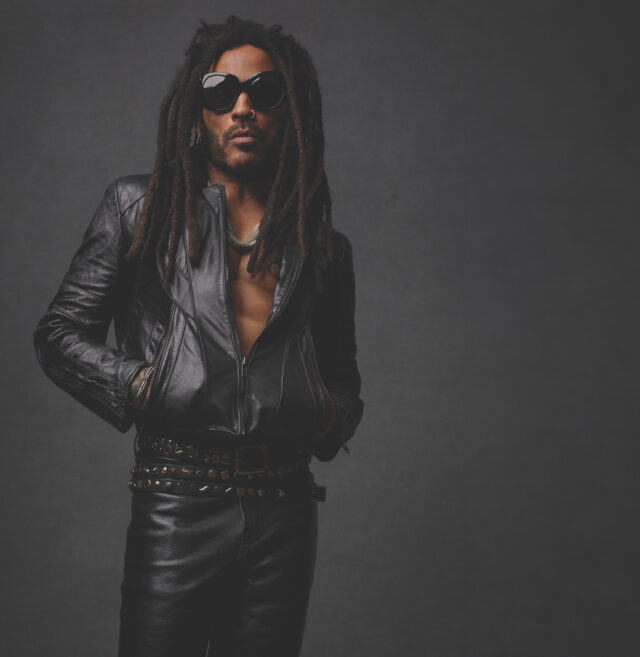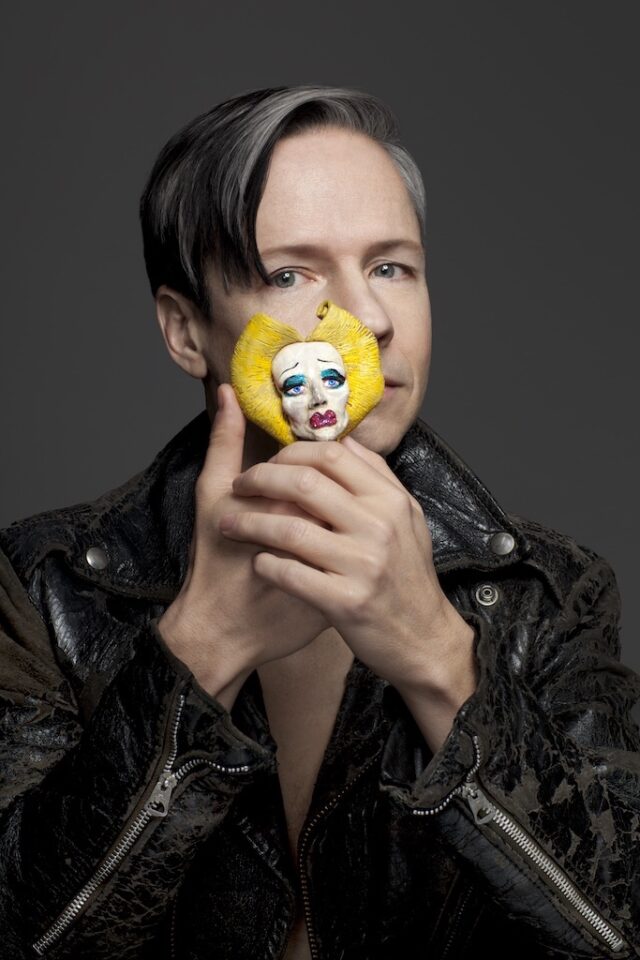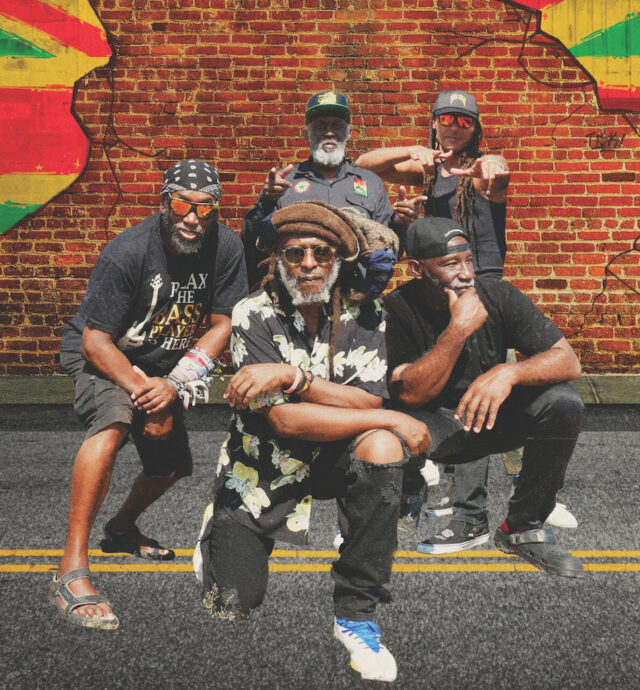
Electro Grooves
St. Lucia deliver energetic synth-pop vibes to Montauk.
By Ray Rogers
No one elevates a summer evening quite like indie synth-pop band St. Lucia. Fronted by husband-and-wife duo Jean-Philip Grobler and Patti Beranek, the quintet has been rousing Montauk crowds for the past decade with their annual high-energy gigs at The Surf Lodge and Solé East.
This year marks their 12th at the outdoor stage overlooking Fort Pond. “I think if we don’t play The Surf Lodge at this point it’s bad juju—maybe Jayma [Cardosa, The Surf Lodge founder] thinks the same,” says Beranek. Though the couple moved from Brooklyn to Konstanz, Germany, near where Beranek grew up, during the early stages of the pandemic, they still relish summer nights in Montauk. “We just love it all—the vibe, the people, and it’s just become a little ritual. We have the best time. It’s a very small stage, but we love that because we’re so tight and sweaty. For me that’s the highlight of summer.”
This season, they’ll be debuting songs off their double record, Fata Morgana, the second half of which was just released. “The title means a form of mirage—the conditions have to be exactly right, and it usually happens over water of a flat piece of land,” says Beranek. Adds Grobler, “It can look like a Rorschach test that seems to be floating above, and then below it is a reverse reflection.” While the first side is “quite experimental” in Grobler’s words, with a distinctly ’60s-’70s psychedelic feel and epic strings adding to the vibe, the second side, including newly released single “Crimes of Passion,” is more in keeping with St. Lucia’s classic ’80s electro-pop-inflected bouncy hits (“Elevate,” “Dancing on Glass,” “Touch”). “We just run as true as we can to our muse and the creative process and not second-guess it,” says Grobler about the current batch of songs.
Along with the new tunes comes a new look: “We’ve been developing this whole visual concept, with me and Patti wearing the same uniform,” says Grobler, of the matching hats and monochrome jumpsuits the pair don in videos and onstage. “It draws on all sorts of influences like Alejandro Jodorowsky’s The Holy Mountain and Salvador Dalí—there’s a lot of surrealism to it.” Adds Beranek, “it’s a dream world.” Fitting.
St. Lucia play The Surf Lodge on July 6, thesurflodge.com, and Solé East on August 9, soleeast.com.

Art and Alchemy
Suzanne Vega performs fresh songs from her impactful new album and celebrated 40-year career at Stephen Talkhouse.
By Jim Servin
“Whenever I write something, it tends to be a response to what’s in the moment,” says singer-songwriter Suzanne Vega, whose long musical journey was built on her quietly powerful voice, her catalog of poetic songs (“Luka,” “Tom’s Diner,” “Marlene on the Wall,” “The Queen and the Soldier” and “Caramel,” among others), a strong work ethic and an adventurous spirit, as demonstrated in her 2011 one-woman, off-Broadway musical portrait of a literary great, Carson McCullers Talks About Love. “The other thing to know,” continues Vega, “is that my writing tends to come from problems of the moment, and things that bring with them a certain bewilderment. It’s my way of making sense in the world. And right now, there’s a lot to make sense out of. I’m genuinely trying to figure it out. And I mean everything—personally, politically—in every way.”
Flying With Angels, Vega’s just-released 10th studio album, produced by David Bowie collaborator Gerry Leonard, has a charged immediacy, fueled by the artist’s mission to place her stamp on chaotic times. The deeply moving chorus of “Last Train From Mariupol” seeks understanding of the war in Ukraine. “Speakers’ Corner” takes aim at keyboard critics: “It’s the idea that we’ve drifted very far from facts and from values,” says Vega. The haunting title track references Vega’s journey as caretaker for her husband, Paul Mills, a poet and civil rights lawyer who has suffered a stroke and is slowly regaining his ability to speak. “I hope they stay with me, until I can get you home,” she sings, of benevolent forces by her side. “He’s making progress, every day, every week,” Vega reports of the man she first met when she was in college, and married 19 years ago. “That gives me hope.”
Ethereal “Alley” features background vocals from Vega’s 30-year-old daughter Ruby Froom, an accomplished singer-songwriter and scientist, with an album and a PhD in molecular biophysics to her credit. “I’m very proud of her achievements,” says Vega. “I’ve always tried to facilitate anything she’s wanted to do, and she’s accomplished a lot.” The song features a particularly lovely line, “One day you’ll know me, shimmering above, like Marc Chagall in love,” that is pure Vega: wistful, playful, erudite. “I worried about that one,” Vega says of the art reference. “I was trying to give this image of people floating in the air filled with flowers. When I researched it, I would get Marc Chagall paintings. And I thought, ‘This is what I want to put in the song.’ So I went ahead and let myself do it.”
Vega’s trademark cool wit is very much in play. In the punky “Rats,” she takes a snapshot of a vermin-infested New York City. “Lucinda” has Vega clocking the moves of fellow singer-songwriter Lucinda Williams: “She’s a Dusty Springfield of the South, leatherette pants and a pale pink mouth.” (Has Williams been alerted to the tribute? “I don’t know that anyone’s formally presented it to her,” Vega says. “I didn’t want to push the situation.”) Another music icon, Bob Dylan, is honored in “Chambermaid,” inspired by his song, “I Want You,” from the Blonde on Blonde album. Told from the imagined point of view of Dylan’s domestic who “took nothing he would miss,” she steals a kiss from her idol. Vega confesses to similarly smooching Dylan’s cheek after a concert they both headlined. “He blinked, and I think that was 12 years ago, and I’ve never seen him since,” she says with a laugh. “So that bit about stealing a kiss is actually true.” The potential stealth hit of the collection is “Love Thief,” with a sultry Vega adding cerebral edge to a luscious rhythm track inspired by Bobby Womack’s 1972 classic “Woman’s Gotta Have It.”
This year marks the 40th anniversary of the release of Vega’s acclaimed eponymous debut album, but Vega is hardly resting on those laurels: “I’m struggling just like everyone else is, to figure out what the heck is happening,” she says of current mayhem. “I’m not just dishing out platitudes from forty years of experience.” A time-honored troubadour, Vega has the advantage of being able to pack up her songs and guitar and hit the road, no large backing band necessary. Her 2025 tour includes stops in Amsterdam, Berlin and the U.K., with Stephen Talkhouse penciled in for July 13 at 7PM (the following evening, Vega plays Town Hall in Manhattan). What does she most look forward to as her Hamptons concert date approaches, aside from a few nights in her Amagansett summer home? “Friends who are very local have been asking me for years to play Stephen Talkhouse,” says Vega. “I told my management that we should get that on the calendar, so that all my friends can come, and we can all have a little party after.”
Speaking of 40th anniversaries, it’s also that milestone year for the film Desperately Seeking Susan. Production notes often mention that Vega, a long time New Yorker, was a contender for the lead role. How would she have played it differently? “To be honest, I did not think I was the right person for that part, and I think Madonna was great. She was that character,” Vega says. “I was living under the poverty line, but I always had jobs. I was not living this wild life, cruising New York, washing my armpits in public bathrooms. That would never have been me, OK?,” she laughs. “I’m a way more private person.” stephentalkhouse.com

The Legend
Lenny Kravitz rocks Aspen.
By Dimitri Ehrlich
Maybe it’s the healthy lifestyle he adopted, or maybe it’s his genes: His mom, Roxie Roker, was television royalty (she played Helen Willis on The Jeffersons). But more likely it’s the purity of his convictions. True rock stars aren’t made, they’re born. In the case of Lenny Kravitz, not only did he arrive fully baked and glimmering, he never stopped. From the outset, his music announced that he was in love. Not only with the classic rock of the ’60s (and the Beatles in particular) but with love itself. He was like a steamroller of flower power: resistance to that Cheshire cat grin, that velvet howl and those perfect guitar solos was futile.
Musically, Kravitz is more than the sum of the influences he wears proudly on his fringed sleeves. Every fiber of his being is stained with the theatrics of Jimi Hendrix ripping a solo to shreds with his teeth and the orgasmic yowl of Robert Plant. He looks like he was born with mirror shades on, but the image isn’t some sort of cosplay; it’s an organic expression of who he is at a cellular level. Despite decades of being an actual bona fide rock star, the six-pack abs never turned to flab, the waist-length dreadlocks never went gray—even when he cut them off, he just looked younger.
On August 30, when Kravitz headlines Jazz Aspen Snowmass’ 2025 JAS Labor Day Experience, you can hear how he effortlessly blends rock, funk and soul into something timeless, organic and vibey as hell. You’ll notice you may also feel like hugging whoever is dancing next to you. As Kravitz wrote in his 2020 memoir, Let Love Rule: “Whether recording, performing or writing a book, my art is about listening to the inspiration inside and then sharing it with people. Art must bring the world closer together.” jazzaspensnowmass.org

The Troubadour
Aimee Mann showcases her signature wit and singular stories in Hampton Bays.
By Ray Rogers
Leave it to Aimee Mann to celebrate the, yes, 22-and-a-half-year anniversary of one of her iconic albums, Lost in Space—with a fresh vinyl reprint and a tour built around it, including a stop at Canoe Place Inn on June 12. “For one reason or the other, we were a little slow off the mark to get the vinyl out on the 20th,” admits Mann, an acclaimed songwriter famed for her dry wit and insightful lyrics. “We didn’t really think people cared that much if it was exactly on an anniversary.”
Any time is a great time to revisit these finely realized portraits in song—filled with indelible melodies and astute observations of the human condition—but it feels particularly resonant yet again in 2025. “That record has a really dark, kind of lost flavor—and it fits right in with the current mood I think everybody’s in,” says Mann, speaking from her LA home, rows of bookshelves behind her.
Mann, who first rose to pop fame in the ’80s with ’Til Tuesday, has always had a knack for capturing the feel of the times. This is a writer so brilliant her songs—especially “Deathly” with its lyric “Now that I’ve met you, would you object to never seeing each other again?”—inspired Paul Thomas Anderson to write the screenplay for his hit 1999 film Magnolia. (Mann’s “Save Me,” from the soundtrack, was also nominated for an Oscar for Best Original Song.)
The new material she’s working on, she says, is indirectly inspired by the current political climate. “I never really write anything that is directly political, but there’s definitely a feeling of, ‘must be nice to be on your high horse and just not give a shit about anybody else.’ There are a couple of songs with that flavor, which definitely picks up on the political zeitgeist—people making decisions about other people’s lives.”
Throughout her career, she’s explored themes around despair, addiction, general ennui and overall mental health (her 2017 album, which took home a Grammy for Best Folk Album, is even called Mental Illness—in a kind of self-deprecating “I’m just going to own it” title that speaks to her well-trod domain). This fertile ground of our interior worlds has fascinated her since childhood, she says. “It’s kind of like a fun puzzle to figure out what’s going on with yourself: Why am I having these feelings? Why do I behave this way? Why do other people behave this way?”
Speaking of puzzles, when it comes to wellness rituals, her go-to is just what one might expect: “Does playing Wordle and Connections and Spelling Bee in The New York Times app count?” canoeplace.com

Glam Provocateur
The live-wire actor, writer and director John Cameron Mitchell brings Hedwig fierceness and a touch of glittery resistance to Guild Hall.
By Ray Rogers
Ray Rogers: What’s your favorite form of resistance in the second Trump era?
John Cameron Mitchell: Funny you should ask, as I’m just today pitching an op-ed about my college tour where I was going to talk about Hedwig and it ended up being like: “OK guys, you can’t cancel a dictator. Stop with the identity politics, learn about punk and get laid while you’re at it.”
RR: What’s giving you hope during these turbulent times?
JCM: It’s being with these young people who, though their youth had been blunted by COVID and screens, still have this great hope in their eyes. So, reminding them that IRL [in real life], being there with your buddies, making something in person that is useful in some way is the beginning of climbing out of your anxiety and depression, and then gives you a bit of a foundation to think about what’s next as things become clearer. My advice to everybody who is on the left is: Ease up on the identity politics. Learn about punk. Learn about AIDS activism, which was applied punk. Things were worse for me and for our friends in the ’80s—they were dropping like flies—and a group of people stepped up and saved us. That gives me hope.
I really feel that Americans are too ornery to actually be dictated to fully. They like a daddy, some people, but once they’ve lost their health care, and the economy has tanked, this will change quickly. I’m a worried optimist here.
RR: What do you have in store for Guild Hall on June 7?
JCM: Well, since it’s only one guitarist with me, it will be more of a campfire version of Hedwig classics, some deep Bowie cuts from a new Bowie show I’m doing, and some originals from Anthem: Homunculus, my fictional podcast musical with Glenn Close and Cynthia Erivo. And some songs from my lockdown album. It’ll be a grab bag and also a kumbaya moment, an antifascist sing-along.
RR: You’ve got a lot in the works right now.
JCM: I’m also working on a memoir, and a new play about a Nazi resistance artist named Claude Cahun, which I’m doing a reading of in June starring Holly Hunter. And I’ve got a podcast out called “Cancellation Island,” about a fictional rehab for canceled people.
RR: You’re always doing these creative endeavors across many media. How do you keep refilling the well?
JCM: Well, that fills it. Each project replenishes the well from a spring, let’s say, below the Earth. Then you always have some life-sustaining liquid to move forward because you are, in effect, pumping it with creativity—pumping it out of the ground with these projects, and opening yourself up to new collaborators. I live in New Orleans now, and it is very much a “Hey, how are you doing” to a stranger on the street kind of place. “What are you up to? I love what you’re wearing.” It reminds me a bit of New York in the ’80s when I came, minus the AIDS. It was frayed and falling apart but arty and collaborative. And it’s this hurricane-hardened hospitality that is just the ticket for today. As long as everyone is contributing, that leads to wellness. With actual collaboration, it’s even been scientifically proven that people are happier and live longer. guildhall.org

Punk Reggae Party
Iconic British roots band Steel Pulse takes arousing victory lap around the world.
by Vivien Goldman
“Steel Pulse have always put our own different spin, lyrically and politically, on what’s going on out there,” says Steel Pulse’s singer/songwriter and front man, David Hinds. The scope of the band’s international 50th anniversary tour is a testament to their remarkable durability. Indeed, as their name suggests, Steel Pulse have been sending out their tough, conscious reggae messages, like smoke signals, without a break, for half a century.
To celebrate this impressive anniversary, have your dancing shoes ready for their show at Canoe Place Inn & Cottages’ Grand Ballroom on June 29. And please keep your mind switched on, along with your ears. Since their earliest hit, 1978’s “Handsworth Revolution,” about their area of Birmingham, Steel Pulse’s songs have been hard-hitting yet pop-catchy. They rouse and summon the like-minded to unite and aim for change, using the energy the group stirs up with anthems like “Rally Round,” “Ku Klux Klan” and “Earth Crisis.”
Co-founders Hinds and keyboardist Selwyn Brown still remain; another original band member, Dr. Mykaell Riley, is now a prominent U.K. academic and propelled the British Library’s recent hit expo about Black U.K. culture, Beyond the Bassline. Steel Pulse are virtually the last remaining active band of that bold U.K. mid-1970s generation, including The Clash, who threw what Bob Marley called the “Punky Reggae Party.” That alliance between beleaguered punk and Rasta youth helped prompt the formation of an enduring grassroots organization, Rock Against Racism. “We know our calling is to spread our idea of roots, and that it be heard worldwide,” Hinds tells Purist. Let’s rejoice that his prophecy is being fulfilled. Catch them while you can. canoeplace.com





